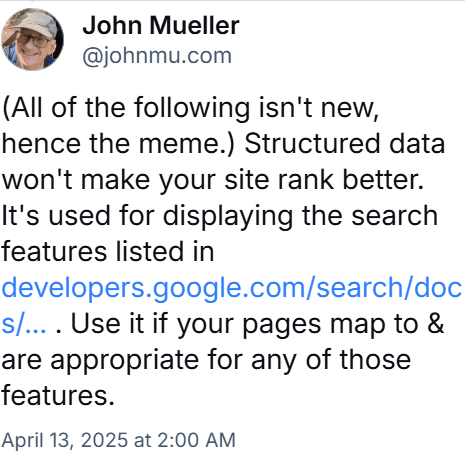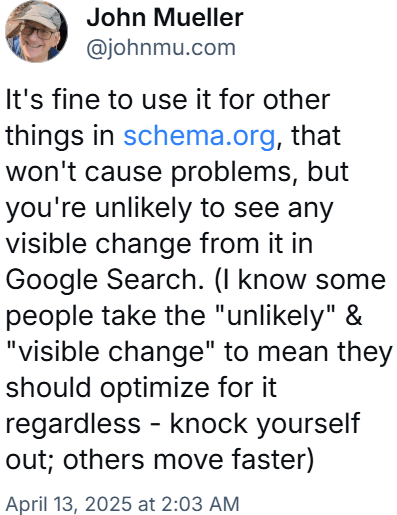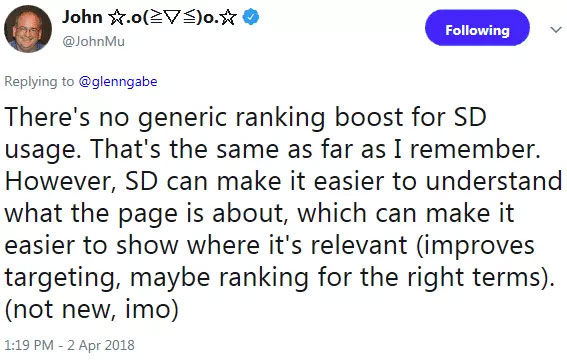Google’s John Mueller answered a question on Bluesky about whether structured data helps with SEO, which may change how some people think about it.
Schema.org Structured Data
When SEOs talk about structured data they’re talking about Schema.org structured data. There are many kinds of structured data but for SEO purposes only Schema.org structured data matters.
Does Google Use Structured Data For Ranking Purposes?
The person starting the discussion first posted that they were adding structured data to see if it helps with SEO.
Mueller’s first post was a comment about the value of preparation:
“Yes, and also no. I love seeing folks stumble into the world of online marketing, search engines, and all that, but reading up on how things technically work will save you time & help you focus.”
The original poster responded with a question:
“In your experience, how has it helped?”
That’s when Mueller gave his answer:
“(All of the following isn’t new, hence the meme.) Structured data won’t make your site rank better. It’s used for displaying the search features listed in developers.google.com/search/docs/… . Use it if your pages map to & are appropriate for any of those features.”
Screenshot Of Mueller’s Saying Structured Data Won’t Make Site Rank Better

Structured Data Won’t Cause Visible Change In Google Search
Mueller followed up with a clarifying post to note that structured data won’t cause a visible change in Google Search. When he says Google Search, it’s likely he’s talking about the regular organic search results, not the rich results.
Here’s what he said:
“It’s fine to use it for other things in schema.org, that won’t cause problems, but you’re unlikely to see any visible change from it in Google Search. (I know some people take the “unlikely” & “visible change” to mean they should optimize for it regardless – knock yourself out; others move faster)”
Screenshot Of Mueller Comment Unlikely To Visible Change In Google Search

Aligns With 2018 Guidance: No Generic Ranking Boost
John Mueller’s statement aligns with one he made in 2018 (in a since deleted tweet) where he explained that there is “no generic ranking boost” from structured data.
Here’s what Mueller said back in 2018:
“There’s no generic ranking boost for SD usage. That’s the same as far as I remember. However, SD can make it easier to understand what the page is about, which can make it easier to show where it’s relevant (improves targeting, maybe ranking for the right terms). (not new, imo)”
Screenshot Of Deleted Tweet

Unstructured data in this context is a web page that includes a header section, navigational links, logos, links to related content, advertising, and the main content. That’s what unstructured data is and the challenge for a search engine is to reduce all that information to the main content.
Structured data shows the content in an organized manner that makes it easier for machines (search algorithms) to understand. Structured data organizes the information by Structured Data Type (like a review structured data type) and the associated properties of that particular structured data type (author, itemReviewed, reviewRating, etc.).
That’s why it’s called structured, because it’s web page content that’s organized, or categorized, by what each part of the content “type” it is (author, what was reviewed, the image, review rating, etc.) and that makes it easy for Google to display the content in Rich Results, which is a search feature.
It’s just content like any other content, but it’s organized content. The rule of thumb is that anything that makes it easier for Google to understand the content is a good thing for ranking because Google can’t rank if it can’t understand what the content is about. That’s what Mueller means when he tweeted in 2018:
“…which can make it easier to show where it’s relevant (improves targeting, maybe ranking for the right terms). “
How Google Uses Structured Data In Search Features
Google uses only a fraction of the available Schema.org structured data. There are currently over 800 Schema.org structured data types and Google only uses around 30 types for which it publishes structured data documentation for required properties for each structured data type and other guidelines and requirements.
The only use Google has for structured data is to collect information in a machine readable format so that it can then use the information for displaying rich results, which can be seen for recipes, reviews, displaying website information in carousel format, and even to enable users to buy books directly from the search results.
Adding Schema.org structured data doesn’t guarantee that Google will display the site with a rich results feature in search. It only makes a site eligible to be displayed in rich results. Adding non-documented forms of Schema.org structured data won’t affect search optimization for a site because Google ignores all but the roughly thirty structured data types.
What About Structured Data And AI Search Rankings
It might seem confusing that structured data doesn’t help a site rank better but it makes more sense to think about it as something that makes a site eligible for rich results. In the context of AI Search results, Google uses regularly indexed data from websites and because AI search results are a search feature, it may rely on the documented structured data for search related features (read more about that here: Google Confirms: Structured Data Still Essential In AI Search Era.)
The main points about structured data in the context of AI search is that according to what was shared at a recent Search Central Live (hat tip to Aleyda Solis):
“Structured data is critical for modern search features
Check the documentation for supported types
Structured data is efficient,
…for computers easy to read,
… and very precise”
In a nutshell, for the context of AI Search:
Structured data supports search features and AI Search is an AI feature. AI search also relies on the regular search index apart from the Schema.org structured data.
Read the original discussion on Bluesky:
Adding structured data to see if it helps with SEO
Featured Image by Shutterstock/ViDI Studio





